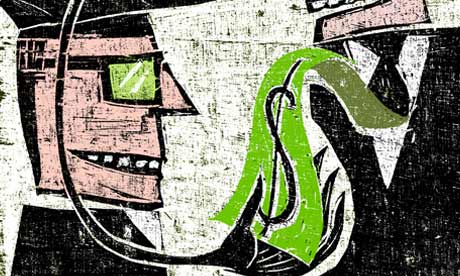If scholars don't take an ethical stance against corporate money, where's the moral check on power?

Those in the strongest position to challenge climate change are instead lending it their ‘moral prestige'. Illustration by Daniel Pudles
In 1927 the French philosopher Julien Benda published a piercing attack on the intellectuals of his day. They should, he argued in La Trahison des Clercs (the treason of the scholars), act as a check on popular passions. Civilisation, he claimed, is possible only if intellectuals stand in opposition to the demands of political "realism" by upholding universal principles. "Thanks to the scholars," he said, "humanity did evil for two thousand years, but honoured good." Europe might have been lying in the gutter, but it was looking at the stars.
But those ideals, Benda argued, had been lost. Europe was now lying in the gutter, looking into the gutter. The "immense majority" of intellectuals, artists and clergy had joined "the chorus of hatreds": nationalism, racism, the worship of power and war. In doing so, they justified and magnified political passions. Across Europe, scholars on both the left and the right had become "ready to support in their own countries the most flagrant injustices", to abandon universal principles in favour of national exceptionalism and to proclaim "the supreme morality of violence". He quoted the French anarcho-syndicalist Georges Sorel, who eulogised "the superb blond beast wandering in search of prey and carnage".
The result of this intellectual support for domination, Benda argued, was that there was now no moral check on the pursuit of self-interest. Rather than forming a bulwark against popular delusions, Europe's thinkers turned them into doctrines. With remarkable foresight, Benda predicted that this would lead inexorably to "the greatest and most perfect war ever seen in the world". This war would be genocidal in intent, and would not be stopped by any treaties or institutions. In 1927, these were bold claims.
I'm not suggesting an equivalence between those times and these. I'm summarising Benda to highlight a general principle: the need for a disinterested class of intellectuals which acts as a counterweight to prevailing mores. Racism, nationalism and war are only three of the many hazards to which society is exposed if that challenge should fail: if, that is, most scholars side with the soldiers or the sellers.
Today the dominant forces have changed. Now the weak state, not the strong state, is fetishised by those in power, who insist that its functions be devolved to "the market", meaning corporations and the very rich. Economic growth and the forces that drive it, whether they enhance or harm people's lives, are venerated. And too many scholars seem prepared to support the new dispensation.
Two weeks ago I castigated the new chief scientist, Sir Mark Walport, for misinforming the public about risk, making unscientific and emotionally manipulative claims and indulging in scaremongering and wild exaggeration in defence of the government's position. Since then I have seen his first speech in his new role and realised that the problem runs deeper than I thought.
Speaking at the Centre for Science and Policy at Cambridge University, Walport maintained that scientific advisers had five main functions, and the first of these was "ensuring that scientific knowledge translates to economic growth". No statement could more clearly reveal what Benda called the "assimilation" of the intellectual. As if to drive the point home, the press release summarising his speech revealed that the centre is sponsored, among others, by BAE Systems, BP and Lloyd's.
Last week, two days before CO2 concentrations in the atmosphere reached 400 parts per million, Oxford University opened a new geoscience laboratory named after its sponsor, Shell. Among its roles is helping to find and develop new sources of fossil fuel.
This is one of many such collaborations. Last year, for instance, BP announced that it will spend £60m on research at Manchester University partly to help it drill deeper for oil. In the United States and Canada, universities go further: David Lynch, dean of engineering at the University of Alberta, appears in advertisements by the Canadian Association of Petroleum Producers, whose purpose is to justify and normalise tar sands extraction.
As the campaign group People and Planet points out, universities help provide fossil fuel corporations not only with expertise but also with a "social licence to operate". Climate change is one of the great moral issues of our age, but the scholars in the strongest position to challenge the industry responsible are, instead, lending it what Benda calls their "moral prestige". Neoliberal economists, imperialist historians, war-mongering philosophers, pliable chief scientists, compromised energy researchers: all are propelling us into the arms of power.
In 1998, the vice-chancellors of the UK's universities decided that they would no longer take money for cancer research from tobacco firms. Over the past few days I have asked the Shell professor of earth sciences at Oxford, the university itself and the umbrella bodyUniversities UK to explain the ethical difference between taking tobacco money for cancer research and taking fossil fuel money for energy research. None of these great heads, despite my repeated attempts to engage them, were prepared even to attempt an answer.
So perhaps this is where hope lies: unlike Benda's scholars, these people have not yet developed a justifying ideology which permits them to excuse or glorify the compromises they have made with power. Perhaps we have not yet abandoned the redeeming hypocrisy of what Benda called "honouring good".


